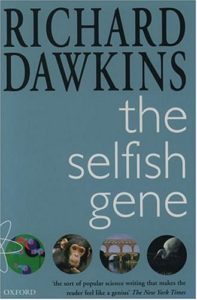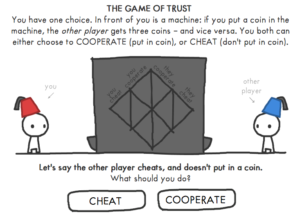Fun interactive game theory simulator shows how trust and mistrust evolve
The Evolution of Trust is an interactive presentation by Nicky Case that explores cheating and cooperation. The short narrative experience attempts to explain the rise of mistrust and suspicion in today’s society through the lens of game theory.
The Christmas Truce of 1914 was a remarkable show of charity, as soldiers from World War One laid down their arms and turned battlefields into soccer pitches. Recent attempts to recreate this event in Battlefield 1 failed. Figuring out exactly what made the truce possible is a central question of The Evolution of Trust.
To answer this question, Case proposes a thought experiment. There is a machine where two players are meant to insert coins. If both insert one coin, each get two in return. However, if one player withholds their coin and the other inserts their own, the cheater gets three coins instead. If both cheat, they get nothing. What is the optimal strategy? Cheating. There’s everything to gain and nothing to lose.
Case expands to add a variety of strategies to examine if cheating is truly optimal. There are players who only cheat after being wronged and those who copy the last action taken against them. As more play-styles are added, cheating becomes less viable. The Evolution of Trust starts to account for issues like human errors and repeated contact with other players. More complex behavior emerge, including forgiveness and cooperation. These behaviors starts to overwhelm those who always cheat.
According to the model, trust can overcome suspicion if there’s repeated interactions and the potential for win-win scenarios. It helps explain why certain games and their structures fail to encourage cooperation.
PlayerUnknown’s Battlegrounds makes repeated contact with other players nearly impossible from game to game, and the goal itself makes a win-win scenario literally impossible. As a result, cheating and betrayal are effective, while trust is risky.
The Evolution of Trust does an excellent job explaining why players cooperate and cheat. It’s a brisk look at the multiple ways someone can play a game and how different strategies can win out against others. If you want a good sense of how multiplayer games work, definitely give it a look.
 The Selfish Gene by Richard Dawkins is dedicated to analyzing game theory scenarios like this.
The Selfish Gene by Richard Dawkins is dedicated to analyzing game theory scenarios like this.
Richard Dawkins’ brilliant reformulation of the theory of natural selection has the rare distinction of having provoked as much excitement and interest outside the scientific community as within it. His theories have helped change the whole nature of the study of social biology, and have forced thousands of readers to rethink their beliefs about life.
In his internationally bestselling, now classic volume, The Selfish Gene, Dawkins explains how the selfish gene can also be a subtle gene. The world of the selfish gene revolves around savage competition, ruthless exploitation, and deceit, and yet, Dawkins argues, acts of apparent altruism do exist in nature.
Sources: ncase.me, kotaku.com
 bfc.green Promoting Green Lifestyle
bfc.green Promoting Green Lifestyle



